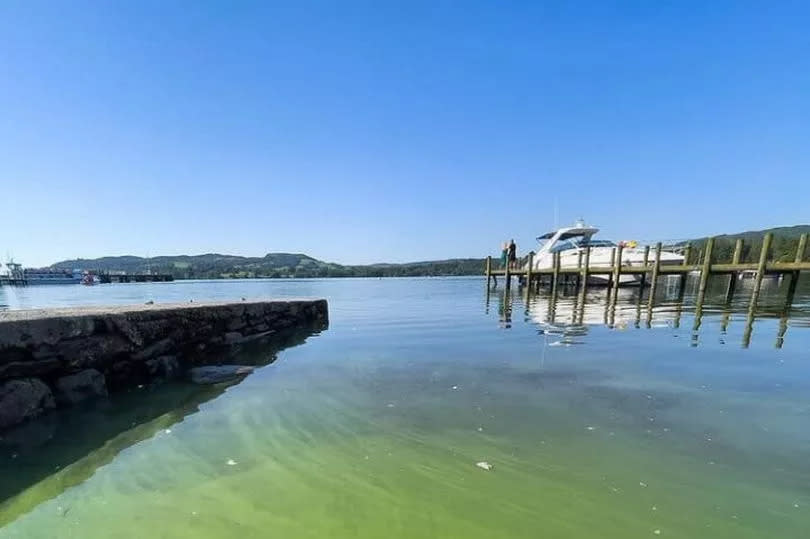Lake Windermere has turned green due and tourism is to blame, experts say

Experts have revealed a fall in the quality of Lake Windermere's water, leading it to become green in colour, have been a result of tourism.
Map Impact, an environmental data services company have published their findings from a UK Space Agency Climate Call backed project, studying the factors impacting the world famous lake. Using satellite technology, the researchers found the water quality has come from an increase in human movement for the catchment area.
This influx in tourism has created "over capacity issues for local wastewater infrastructure" and have been coupled with higher temperatures from weather and climate conditions, leading to the Lake's colour change. The green colour is caused by an increase in chlorophyll and algal bloom events and significantly harming the Lake's ecosystem too.
READ MORE:
The idyllic village home to famous bakery, stunning views and dog-friendly pub
Tiny secluded beach just minutes from Lancashire where visitors say 'this is the one'
Commencing in September 2023, the project ran for six months and drew on knowledge from local community stakeholder groups, historic data and records from various organisations. Data and satellite imagery were obtained from the entire Lake Windermere catchment area, providing fresh insight on algae blooms caused by nutrient input regularly seen during peak tourist season.
Richard Flemmings, Map Impact CEO said: "By taking a novel catchment wide perspective we have been able to bring new evidence to support increased understanding of Lake Windermere’s condition. We’re proud to be able to openly publish the results of this study, including limitations, for use by anyone in the community."
Save Windermere is a local campaign group which argued the excessive nutrient input had been down to inadequate local wastewater infrastructure. Its spokesperson, Matt Staniek said: "This isn’t just about visitor numbers or climate change; it’s about the failure of the Environment Agency and United Utilities to adequately manage and invest sufficiently in sewage infrastructure, essential for the lake’s resilience to these pressures."
In April, comedian Steve Coogan accused United Utilities of "greenwashing" and "PR spin" for putting sewage into Lake Windermere, the PA News Agency reported. Coogan joined protestors outside the water company's offices and called on the Government to compel them to clean the Lake, rather than pay huge dividends to shareholders.
He told ITV’s Good Morning Britain: "United Utilities have a big PR machine and they put nice fancy offices up like this and say we’re working together with the people of Windermere but it’s all a smokescreen to distract attention from what they’ve been doing over the last 30 years, which is putting treated and untreated sewage into Lake Windermere.
"It’s to such an extent that there are toxic levels of algae, there are algae blooms that show the nitrate levels are like through the roof. And they’ve been doing this year on year."
Historic bloom events had been retrospectively studied using satellite images and correlated with other date sources. Travel restrictions during the coronavirus lockdown meant human movement was limited and had clearly risen when restrictions were lifted - same daily figures peaked at 320,000 visitors.
Normally driven by a combination of climate changes and nutrient input, algae growth often flows into the water from wastewater discharge and agricultural runoff, meaning land use was also studied within the project.
A United Utilities spokesperson said: “Our wastewater treatment works are sized to treat the sewage from maximum population numbers at peak times, and use the highest treatment standards including phosphorus removal and UV treatment to kill bacteria.
“To contribute to the debate about a “discharge-free” solution with no treated or untreated UU discharges, no effluent from the 1,800 private septic tanks or from the additional 89 discharge points around the lake that are owned by others, we carried out a feasibility study that has already been shared with key local stakeholders and we are keen to engage with anyone who might want to investigate this further.”
Dr Paul Bate, Chief Executive of the UK Space Agency, said: "The UK has a long history of expertise and innovation in Earth observation, developing satellites to collect increasingly detailed data and using that information to build services that help protect our planet.
"Map Impact’s report, focusing on one of the UK’s most iconic and important lakes, demonstrates how these data can be used to give us clearer information about how the natural resources around us are changing, helping communities and decision-makers take tangible steps towards improving pollution levels and mitigating their impacts."

 Yahoo News
Yahoo News 
